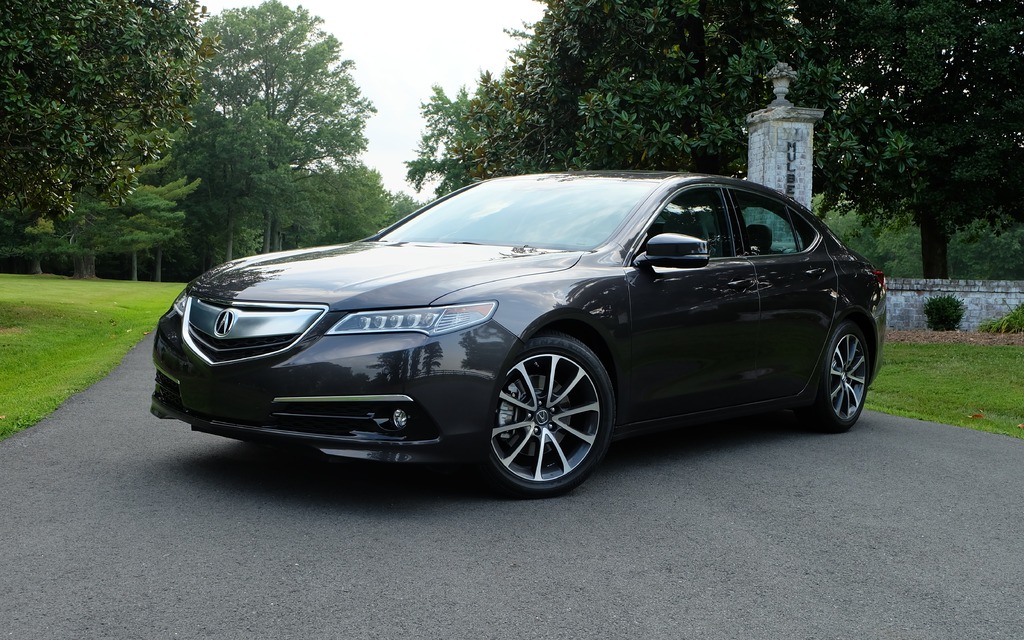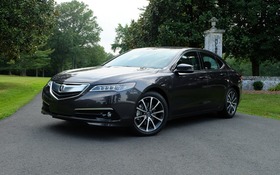2015 Acura TLX: Spring Cleaning

| Strong points |
|
|---|---|
| Weak points |
|
Acura’s SUVs have been selling well since they were updated, but the same can’t be said about the brand’s sedans. The TSX is still offered, but it simply doesn’t stand out from the crowd. The TL is also available—at least until stocks run out—but its technologies haven’t kept pace with the competition. To make matters worse, buyers have a hard time telling these two models apart, as they are essentially the same size and when you add options to the TSX, it can come to the same price as the TL. It’s clear that Acura needs to restructure its product line, lest it lose customers to other Japanese and German labels.
One car to replace two
The new Acura TLX has a tough mission: to replace the old TSX and TL, both of which will soon be retired. To do so, the TLX is being offered with a choice of two engines. The 2.4-litre four-cylinder produces 206 horsepower and works in tandem with an eight-speed dual-clutch automatic transmission. Like a regular automatic, this gearbox is equipped with a torque converter. Without going into the technical details, we’ll just say that the combination of these technologies results in flexible handling at low revs and much faster gear shifting than automatics with planetary gears. The other mill is a 3.5-litre V6 that delivers 290 horsepower. Mated to a nine-speed automatic, it comes with a cylinder-deactivation system that helps keep fuel consumption down. The TLX V6 can also be equipped with all-wheel drive, though the four-cylinder version cannot.
Don’t judge a book by its cover
As soon as you see the TLX, you’ll notice that Acura didn’t exactly set out to floor the public with its style. The exterior is benign yet somehow elegant. The only eye-catching aspect is the LED headlamps. Inside, the vehicle’s designers were a little more inspired: there are high-quality plastics, aluminum accents and even a few wood inlays. The dashboard display is clear, featuring a small central screen flanked by two large gauges. The infotainment controls will be familiar to anyone who has already driven an Acura, though the system itself has been fully updated. The ELS sound system comes with 10 optional speakers (or seven factory-standard ones) that faithfully reproduce the most complex musical pieces.
The front seats are pleasantly comfortable over long distances, though I must say that I personally would have appreciated a little more side bolstering for support on corners. In back, there’s a good amount of head- and leg-room. The soundproofing is terrific; as soon as you close the door, all ambient sounds are muted. The TLX comes factory-standard with a sound-cancelling system that “listens” to the passenger compartment and muffles any undesirable noise using the sound system.
Two engines, two personalities
To really understand the difference between the two TLX trims, you’ve got to take them out on the highway. The base trim was designed to replace the TSX and thus it has preserved its sporty qualities. It’s extremely easy to handle (thanks in large part to Acura’s P-AWS system, which allows the rear of the car to pivot slightly on corners) and its weight is nicely distributed. It may not be the fastest on straights, but its dual-clutch transmission can shift very quickly and allows you to keep revs high at all times so that the VTEC can unleash all of its horses. When you drive it more reasonably, Acura promises that it consumes 9.6 L/100 km in the city and 6.6 L on the highway.
Meanwhile, the V6 is the spiritual successor to the TL. Therefore, it offers more torque and is more comfortable on long stretches of highway rather than small, winding roads. Its automatic transmission is transparent, and the cylinder-deactivation system is hard to detect. In fact, Acura put a lot of work into this aspect and even designed active engine supports to neutralize the vibrations that inevitably result when the engine uses just half of its cylinders. The front-wheel drive V6 also comes with all-wheel steering, which really helps improve its handling. However, the all-wheel drive versions still do better in this regard—they’re so sporty that they practically make you forget that you’re driving an intermediate sedan! With its active torque vectoring, the TLX SH-AWD stays firmly glued to the road. While I look forward to testing this car in winter conditions, I’m already aware of the price I’ll have to pay for this added dexterity: the AWD model posts fuel consumption rates of 11.2 L/100 km in the city and 7.5 L on the highway, compared to 9.6 and 6.9 in the front-wheel drive version.
No room for error
If Acura wants to increase its sales in the luxury sedan market, it can’t afford to make any mistakes with the TLX. After all, the competition is fierce from the BMW 3-Series, Lexus IS and Infiniti Q50. The TLX certainly has a lot going for it, including a starting price of $34,990 ($47,490 for a fully equipped AWD), a selection of engines, a high-quality interior, good reliability and affordable maintenance that is typical of Japanese products. Now we just have to wait and see how buyers will react.











